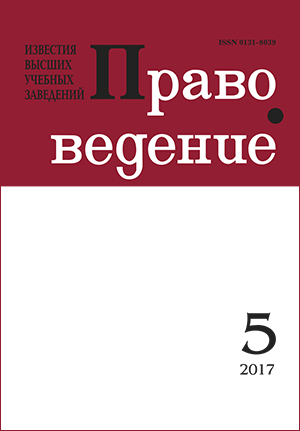Temporal ontology of law and the problem of overcoming legal metaphysics
Abstract
Review of the monograph of the Ukrainian legal scholar A. V. Stovba “Temporal Ontology of Law” (St. Petersburg, 2017) critically analyses the main provisions of the author’s philosophical and legal concept. The latter challenges traditional approaches to interpretation of law. Based on the non-classical philosophy of law (ontology of law by M. Heidegger, legal phenomenology, legal existentialism as well as legal hermeneutics), the author sets his own “temporal-ontological” approach against “legal metaphysics” (legal positivism and deontological natural law). The temporal-ontological concept is focused on the statement that law initially exists as a discrete set of singular legal events. The review shows contradictions between existential and sociological aspects of the author’s understanding of law. It reveals the connection between certain provisions of the temporal legal ontology and the sociological legal positivism as well as the metaphysical legal ontology. According to the temporal-ontological concept, classical metaphysics of natural law is replaced by non-classical metaphysics. Metaphysics is turned out to be a necessary and inevitable feature of such understanding of law that is striving for cognition of the essence of law.
Keywords:
deontological concepts of natural law, ontological concepts of natural law, empirical approaches to the understanding of law, sociology of law, phenomenology of law, legal metaphysics
Downloads
References
Downloads
Published
How to Cite
Issue
Section
License
Articles of "Pravovedenie" are open access distributed under the terms of the License Agreement with Saint Petersburg State University, which permits to the authors unrestricted distribution and self-archiving free of charge.




